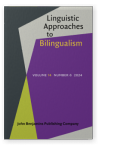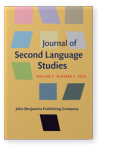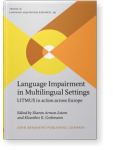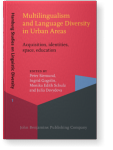Yulia Rodina
List of John Benjamins publications for which Yulia Rodina plays a role.
Journal
2024 Individual language experience determinants of morphosyntactic variation in heritage and attriting speakers of Bosnian and Serbian: A causal inference approach Linguistic Approaches to Bilingualism: Online-First Articles | Article
Using a causal inference approach, we explored the relationships among the language experience determinants of morphosyntactic sensitivity, to identify the factors that indirectly and directly cause its acquisition or maintenance in immigration contexts. We probed the sensitivity to… read more
2022 Cross-linguistic influence in the acquisition of articles in L3 English by Danish-Russian bilingual children Journal of Second Language Studies 5:2, pp. 235–265 | Article
Recent models of third language acquisition (L3A) propose that previous linguistic knowledge largely has a facilitative effect. That is, either typological proximity or linguistic similarity will mostly lead to facilitation and the patterns of non-facilitation will be rather subtle. The present… read more
2021 How oral texts are organized in monolingual and heritage Russian: Evidence from six countries Language Impairment in Multilingual Settings: LITMUS in action across Europe, Armon-Lotem, Sharon and Kleanthes K. Grohmann (eds.), pp. 47–76 | Chapter
The present study examines narrative macrostructure, measured as Story Structure (SS) and Story Complexity (SC), in bilinguals speaking Russian as their home/heritage language (L1) and exposed to different societal languages (L2), while focusing on the effects of different L2s, bilingualism, and… read more
2013 Two gender systems in one mind: The acquisition of grammatical gender in Norwegian-Russian bilinguals Multilingualism and Language Diversity in Urban Areas: Acquisition, identities, space, education, Siemund, Peter, Ingrid Gogolin, Monika Edith Schulz and Julia Davydova (eds.), pp. 95–126 | Article
This study investigates the simultaneous acquisition of two different grammatical gender systems by Norwegian-Russian children. The main difference between the two languages is transparency of gender assignment: Gender is relatively predictable in Russian, while it is more or less idiosyncratic in… read more



